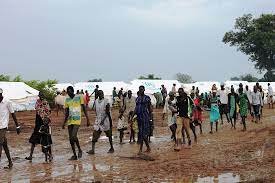UN relief chief calls for overhaul in humanitarian assistance delivery

The UN’s emergency relief chief on Monday outlined the need for a fundamental shift in how humanitarian assistance is delivered, advocating for greater understanding of the needs of crisis-affected populations and a more proactive approach.
In a keynote address to the 2024 European Humanitarian Forum, Martin Griffiths outlined the need for the change.
“I’m more convinced than ever, not just because of these crises, but also out of a sense of values, on the need for a step change in how we deliver assistance. This has to start with a more precise understanding of what people in crisis really need, not what we think they need, what they think they need,” he said.
Need to do betterWe need to do better, he continued, with many feeling unheard.
“We need to learn how to listen”, the Humanitarian Affairs chief added.
He also emphasized the need to be more proactive “to help people get ahead of predictable crises, reducing humanitarian impact and cost, and more flexible funding…that gets support where it needs to go fast, including to local actors and groups directly.”
Alarming funding crisis
Mr. Griffiths, who heads the UN humanitarian affairs office (OCHA), also drew attention to the major funding challenges facing humanitarian organizations.
With stark examples such as the situation in Sudan – where 25 million people need assistance this year but only 4 per cent of the required funding had been secured – he underscored the urgency of mobilizing greater resources to meet the escalating needs of crisis-affected populations.
“We are facing an alarming funding crisis,” he warned.
Break down silos
Mr. Griffiths also emphasized the critical importance of community investment, particularly in addressing challenges posed by climate change.
He stressed the need for greater collaboration, coordination and integration within the humanitarian, development and climate finance sectors.
Silos needed to be broken down which stand in the way of community action “not in high level panels but in learning and listening together to the needs of those we serve and passing between us those aspects to which we can produce a response,” he said.
Visit UN News for more.










